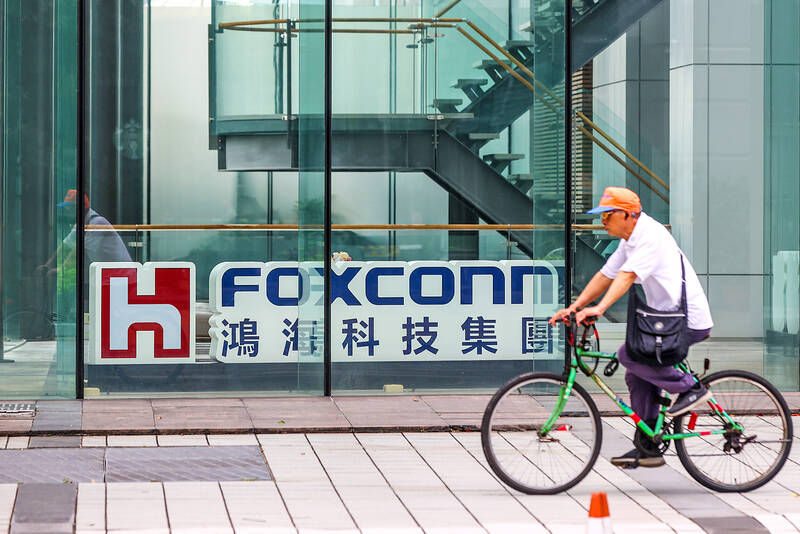Vietnamese officials have called on Apple Inc supplier Foxconn Technology Group (富士康科技集團) to voluntarily reduce power use by 30 percent at its assembly plants in the north of the nation where there were electricity outages last year, two people familiar with the matter said.
The request for energy-saving measures, which two other industry sources said was sent to multiple manufacturers, is precautionary and aimed at averting a repeat of last summer, when power shortages led to more than US$1 billion in lost output.
The request to Foxconn — known as Hon Hai Precision Industry Co (鴻海精密) in Taiwan — was “an encouragement,” not a requirement and has not had any impact on production, one of the people said.

Photo: Ritchie B. Tongo, EPA-EFE
Vietnam is increasingly welcoming multinational companies, some spreading their risk from traditional manufacturing base China amid rising trade tensions with the US.
The Southeast Asian nation relies on foreign investment for economic growth and has been trying to attract energy-intensive industries, such as semiconductor manufacturing.
However, a heat wave in May and June last year triggered power shortages that interrupted business in the north, causing US$1.4 billion in losses, or 0.3 percent of GDP, World Bank preliminary estimates showed.
Vietnamese Prime Minister Pham Minh Chinh in March pledged to foreign investors that power shortages would not happen again.
The government has asked coal-fired power plants to delay maintenance to meet higher electricity demand in the hottest months, one of the people said.
Foxconn is the world’s largest contract electronics manufacturer. It has half a dozen plants in northern Vietnam, including in Bac Giang Province where local authorities said it assembles Apple Inc’s MacBooks and iPads.
State-owned provincial power distributor Bac Giang Power Co in March said that it had asked industrial parks and authorities “to coordinate in implementing electricity savings,” according to a statement posted on the Web site of the Electricity Regulatory Authority of Vietnam.
Vietnam’s weather conditions are less challenging this year than last year, but authorities have boosted imports of coal and encouraged energy-saving to avoid shortages.
Energy-saving measures appear to differ nationwide. An official at an industrial park in another northern province said manufacturers have been asked to reduce power consumption on some days this month.

The US dollar was trading at NT$29.7 at 10am today on the Taipei Foreign Exchange, as the New Taiwan dollar gained NT$1.364 from the previous close last week. The NT dollar continued to rise today, after surging 3.07 percent on Friday. After opening at NT$30.91, the NT dollar gained more than NT$1 in just 15 minutes, briefly passing the NT$30 mark. Before the US Department of the Treasury's semi-annual currency report came out, expectations that the NT dollar would keep rising were already building. The NT dollar on Friday closed at NT$31.064, up by NT$0.953 — a 3.07 percent single-day gain. Today,

‘SHORT TERM’: The local currency would likely remain strong in the near term, driven by anticipated US trade pressure, capital inflows and expectations of a US Fed rate cut The US dollar is expected to fall below NT$30 in the near term, as traders anticipate increased pressure from Washington for Taiwan to allow the New Taiwan dollar to appreciate, Cathay United Bank (國泰世華銀行) chief economist Lin Chi-chao (林啟超) said. Following a sharp drop in the greenback against the NT dollar on Friday, Lin told the Central News Agency that the local currency is likely to remain strong in the short term, driven in part by market psychology surrounding anticipated US policy pressure. On Friday, the US dollar fell NT$0.953, or 3.07 percent, closing at NT$31.064 — its lowest level since Jan.

The New Taiwan dollar and Taiwanese stocks surged on signs that trade tensions between the world’s top two economies might start easing and as US tech earnings boosted the outlook of the nation’s semiconductor exports. The NT dollar strengthened as much as 3.8 percent versus the US dollar to 30.815, the biggest intraday gain since January 2011, closing at NT$31.064. The benchmark TAIEX jumped 2.73 percent to outperform the region’s equity gauges. Outlook for global trade improved after China said it is assessing possible trade talks with the US, providing a boost for the nation’s currency and shares. As the NT dollar

The Financial Supervisory Commission (FSC) yesterday met with some of the nation’s largest insurance companies as a skyrocketing New Taiwan dollar piles pressure on their hundreds of billions of dollars in US bond investments. The commission has asked some life insurance firms, among the biggest Asian holders of US debt, to discuss how the rapidly strengthening NT dollar has impacted their operations, people familiar with the matter said. The meeting took place as the NT dollar jumped as much as 5 percent yesterday, its biggest intraday gain in more than three decades. The local currency surged as exporters rushed to